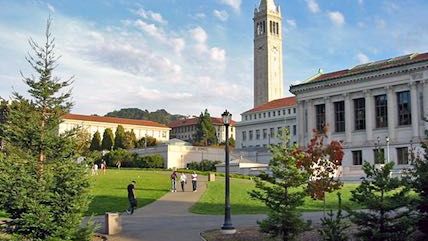Department of Justice: If Disabled People Can't Use Berkeley's Free Online Courses, No One Can
The university will have to remove free online content that doesn't meet the standards of the Americans with Disabilities Act.


Harrison Bergeron should enroll at the University of California-Berkeley. The federal Department of Justice recently informed the university that the online content it makes available to the public free of charge runs afoul of the Americans with Disabilities Act—blind and deaf people wouldn't be able to access it, according to the government.
In response, Berkeley is considering simply removing the online resources, since that's much cheaper than becoming ADA compliant.
You might say, well, Berkeley is a public university, and has a responsibility to make its resources available to all students, regardless of their disability status. That's true. But here's the thing: no Berkeley student has complained. The online courses have proven to be perfectly accessible to the entire student body thus far.
According to DOJ's memo, the two complainants are both members of the National Association for the Deaf. They work for Gallaudet University, a school for the deaf in Washington, DC. They have nothing to do with Berkeley. They tried to watch some of the videos Berkeley posted online, but found that they were unable to comprehend them.
If Berkeley had not made its online courses free and public, it would not have invited this complaint. But since anyone is allowed to watch the university's online lectures and videos, the fact that some of them aren't captioned—and are thus inaccessible to the hearing-disabled community—is a problem, as far as the law is concerned.
Since accommodating two random people—activists for the disabled community, it seems—would be extremely costly, Berkeley is probably going to just get rid of the offending resources entirely, according to a press release:
In many cases the requirements proposed by the department would require the university to implement extremely expensive measures to continue to make these resources available to the public for free. We believe that in a time of substantial budget deficits and shrinking state financial support, our first obligation is to use our limited resources to support our enrolled students. Therefore, we must strongly consider the unenviable option of whether to remove content from public access.
Special thanks to the DOJ—fulfilling its role here as the Handicapper General—for ensuring equal access to public education, where "equal access" is defined as "no access for anybody."


Show Comments (106)